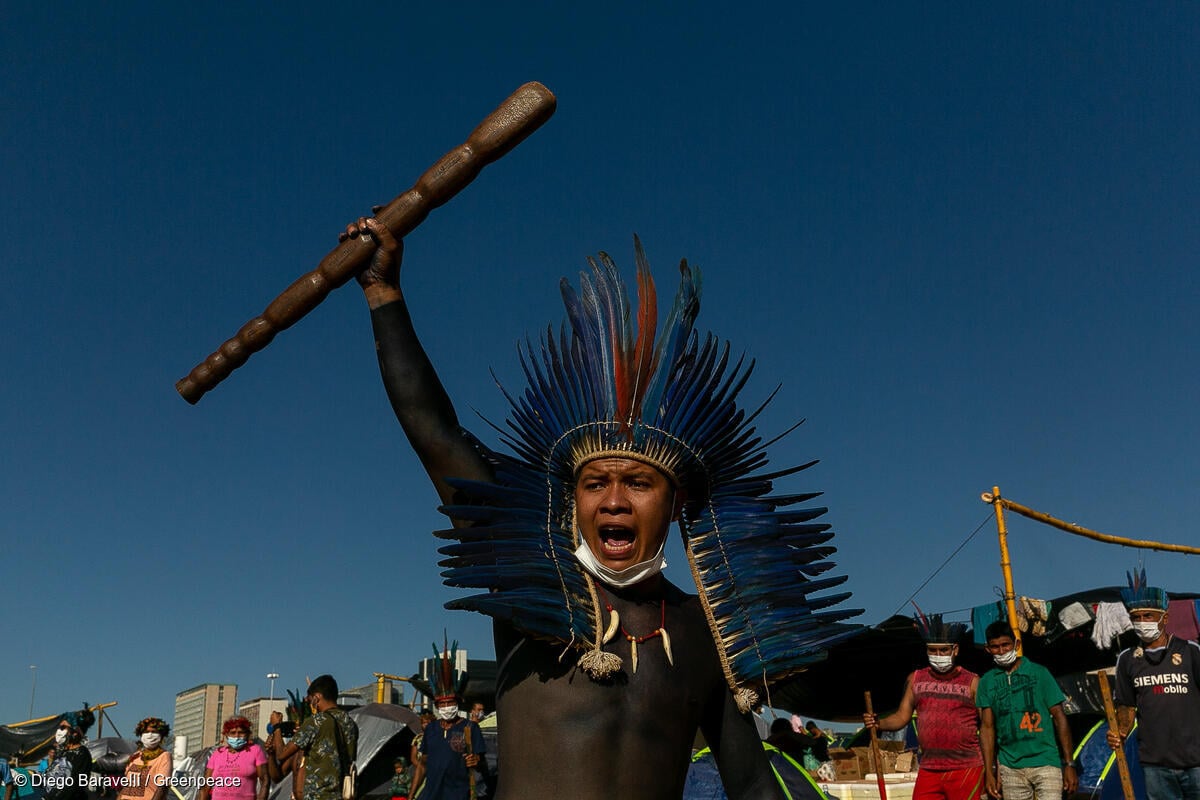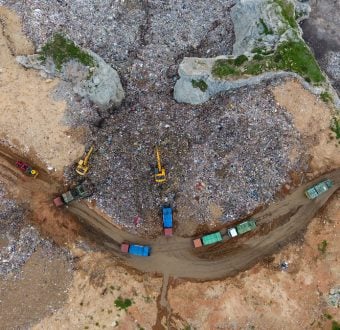The “Struggle for Life ” (“Luta pela vida”) Camp has brought together up to 6,000 Indigenous leaders and activists from all regions of the country to protest the government’s anti-Indigenous policies and rollbacks on protections for their lands and lives.
Ipê square in Brasília is currently the biggest Indigenous village in Brazil. And it’s the largest Indigenous demonstration in Brazil’s history.
What are they protesting?
The current Brazilian Government led by far-right President Jair Bolsonaro has an explicitly anti-Indigenous agenda, abandoning Indigenous communities as they face invasions from land grabbers, miners, and loggers.
This week is critical because the Brazilian Supreme Court will rule on a legal case that could severely limit Indigenous land rights. The UN Special Rapporteur on the rights of indigenous peoples has said that this case could legitimize violence against Indigenous Peoples and inflame conflicts in the Amazon Rainforest and other areas.
This case comes at a time when the Brazilian Congress is advancing laws that would reward land grabbing, end environmental licensing, open Indigenous Peoples’ lands to mining, and reduce the size of protected Indigenous Peoples’ lands.
These laws are being pushed by industrial agriculture and other sectors like mining, interested in removing Indigenous Peoples from their land to set up plantations and mines.
All of these legal changes would cause particular harm to the 115 officially-recognized uncontacted isolated Indigenous Peoples of Brazil, breaking the protective policy of non-contact with them.

Six thousand Indigenous leaders from all over Brazil gather in Brasília from August 22nd to the 27th in the Struggle for Life camp. © Diego Baravelli / Greenpeace
Why are the legal changes so unfair on Brazil’s Indigenous Peoples?
Indigenous Peoples’ human rights and lands are protected under the 1988 Brazilian Constitution. This means that the Brazilian government must ensure these lands are recognized and protected. Despite this, hundreds of Indigenous Lands have not even been officially recognized – or “demarcated” – by the government.
Now, the far-right industrial agriculture lobby in Brazil is trying to use legal maneuvering in the courts to outright erase the Indigenous land rights outlined in the Constitution.
Even though Indigenous Peoples have occupied these lands since time immemorial, agribusiness interests are trying to draw up an arbitrary rule that Indigenous land claims are only valid if communities were occupying the lands when the 1988 Constitution came into force.
Such a ruling would dismiss the entire history of displacement resulting from violence against Brazilian Indigenous Peoples by state authorities over the last four centuries – murders, massacres, genocides, forced removals from their traditional occupied land or even the intentional spread of disease.

The demonstration is thought to be the biggest Indigenous protest in Brazil’s history. © Diego Baravelli / Greenpeace
Why does the Indigenous “Struggle for Life” mobilization matter to all of us outside Brazil?
The human rights and environmental crises in Brazil are interlinked as their rights are being attacked in order to clear the way for more forest destruction. For landgrabbers, and the mining and agribusiness sectors, they see Indigenous Peoples’ rights as an obstacle to endless expansion.
Indigenous Peoples, especially in the Amazon and other Brazilian forests and wetlands, are on the frontlines of the fight against irreversible climate change. The UN estimates that the land that Indigenous Peoples live on is home to 80% of the world’s remaining biodiversity – carbon-absorbing biodiversity that is crucial in the global fight against climate change.
If Indigenous lands in the Amazon are opened up for large scale industrial farming and mining, the rest of the world will struggle to bring climate change under control. Amidst the “code red” climate emergency, we cannot afford to lose the Amazon.

A win for Indigenous Peoples in Brazil is a win for the whole world in the fight against climate change. © Leo Otero / Greenpeace
What can you do?
Indigenous Peoples in Brazil have issued an international call for solidarity – and it’s up to us to respond. Here are the two most important ways you can support the “Struggle for Life” camp.
- Follow the Indigenous mobilization in Brasilia this week and share on your social media
Let’s show the Brazilian government and decision-makers everywhere that we stand with Indigenous Peoples of Brazil and support their fight to protect their lands, their rights and their lives. The last time Indigenous Peoples protested in Brasilia they were met with police violence — so we need to show that the world is watching.
Follow and share via @APIBoficial, @MidiaNINJA, #LutaPelaVida and #IndigenousEmergency. We’ll also be sharing from the @GreenpeaceBR, @Greenpeace and @GreenpeaceUSA social media channels.
Indigenous leaders in Brazil have called on international governments to not strike any deals with Bolsonaro. John Kerry and the US government need to listen to Indigenous voices. The US government has remained silent on the assault of Indigenous rights in Brazil and a legislative agenda that will accelerate the destruction of the Amazon and its people.
John Kerry needs to understand that Brazil’s legislative measures will reward future land-grabbers and grant impunity for forest destruction. We need to stop all deforestation and end the immediate threat and violence against Indigenous Peoples. Actions should include an immediate response to the radical proposed laws that could “break” the Amazon. The US needs to address its own role in global deforestation and human rights violations both through its import and consumption of forest-and-ecosystem risk commodities. This includes the U.S. promotion and finance of its expansions overseas.
U.S. Climate Envoy, John Kerry has the power to not make deals with Bolsonaro and send the message that the international community won’t compromise with forest destroyers and human rights violators. That’s why we must take rapid action to denounce the attacks against Indigenous Peoples, uphold the land rights of Indigenous Peoples in Brazil, and end the destruction of the Amazon.

